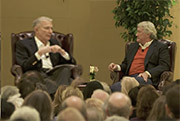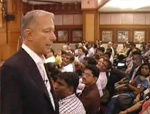Influence
"Erhard’s influence extends far beyond the couple of million people
who have done his courses: there is hardly a self-help book or a management training programme that does not borrow
some of his principles." - Financial Times
Werner Erhard, creator of est (Erhard Seminars Training) became a cultural icon, a force for change that has shaped human consciousness since the early 1970’s. In 1971, Erhard introduced the breakthrough notion of "transformation" to the American public – a notion that redefined how people saw their lives and continues to be seen as a powerful, practical, and relevant resource in contemporary society. To this day, people report remarkable, sustainable benefits in their personal and professional lives – in their families, careers, organizations, and communities.
Millions of people have been influenced by Werner Erhard's ideas through direct participation in programs he developed, the consulting he has personally done for hundreds of corporations and non-profits, and the approximately one hundred management consulting firms that license his approach to management and organizational development. Thought leaders in universities, training organizations, governmental entities, and non-governmental-organizations have used and built on his ideas, and have drawn on them in their programs, books and other publications.
“A different you and a different me must show up each day if we are going to tackle the world’s most vexing problems. [Erhard’s work] talks us through a process of transformation by showing us what it means to be an authentic human being in an inauthentic world, and what it means to take a stand for a world where everyone matters and where everyone can make a difference.”
Wiley “Chip” Souba, MD, ScD, MBA, Professor of Surgery, Geisel School of Medicine at Dartmouth, former Dean of Medicine and VP for Health Affairs, Dartmouth College
Warren Bennis on Werner Erhard and The est Training:
"Werner Erhard has created a technology that has unleashed the possibilities for being human" - Warren Bennis, Distinguished Professor of Business Administration and Founding Chairman of The Leadership Institute at the University of Southern California. Warren Bennis also served as consultant to Werner Erhard and Associates, Chairman of the Steering Committee of the Center for Public Leadership at Harvard University, and authored On Becoming a Leader.
The Center for Compassion and Altruism Research and Education (CCARE), hosted an evening with Werner Erhard at Stanford University's School of Medicine in November 2017.
The organization was founded in 2008 by Dr. James Doty with the goal of promoting, supporting, and conducting rigorous scientific studies of compassion and altruistic behavior. The center collaborates with a number of prominent neuroscientists, behavioral scientists, geneticists and biomedical researchers to closely examine the physiological and psychological correlates of compassion and altruism.
Werner Erhard's work is acknowledged in the following publications:
Speaking Being: Werner Erhard, Martin Heidegger, and A New Possibility of Being Human: “The profound impact that Werner Erhard has had, and continues to have, on culture and society is a manifestation of an incredible insight that Erhard has been making available to the public for decades: the experience of being. This book presents that experience for the first time–both through a transcript of an actual course led by Erhard, along with a study of his methodology for delivering that experience. On display are spectacular moments where Erhard exercises what he has sometimes described as ruthless compassion, and like all forms of compassion, at work is a fundamental motivating desire to alleviate the suffering of others.” James R. Doty, MD; Founder, Director, The Center for Compassion and Altruism Research and Education, Professor of Neurosurgery, Stanford University School of Medicine, Senior Editor of The Oxford Handbook of Compassion Science
The Three Laws of Performance: Rewriting the Future of Your Organization and Your Life, by Steve Zaffron and Dave Logan: "We joined with about a dozen academics, corporate executives, and consultants to examine the impact of personal and organizational performance. This group, which became the Barbados Group after the location of our first meeting, investigated situations in which performance surpassed expectations and then studied the theories that might explain these surprising results. In the course of its work, the group reviewed models from brain sciences, linguistics, complex adaptive systems, philosophy, many other disciplines, as well as ideas from the oral tradition of est and Landmark Education. From this inquiry, a new model of performance emerged...We acknowledge Werner Erhard, the developer of the original ideas on which much of this material is based. We appreciate his commitment, intellectual effort, and support in key aspects of this book."
A New Model of Leadership, by Allan L. Scherr: "We are indebted to Werner Erhard who created the theoretical foundation for this work and to Ronald Heifitz and John Kotter for comments. Steve Zaffron and Olga Loffredi, along with the authors, created and taught a course entitled, "The Ontological Foundations of Leadership and Performance" to students, faculty, and alumni of the Simon School of Business, University of Rochester in 2005 and 2006. Some of the material in this paper is drawn from that course."
The Achievement Habit: Stop Wishing, Start Doing, and Take Command of Your Life, by Bernard Roth: “I am also thankful to Bob McKim for another important thread: he introduced me to the est workshops and to the est organization’s founder, Werner Erhard. I learned a lot from Werner and his work. For me it put an intellectual framework around all the fragments I had gotten from Esalen. I also benefited from coleading several workshops with Werner and his associates. Three years ago I participated in a leadership workshop colead by Werner, Michael Jensen, and Kari Granger. It had been twenty-two years since I last worked with Werner. This experience brought a renewed realization as to how deeply his style and content have influenced my teaching. I am very thankful for his teachings and friendship.”~~~ Dr. Bernard Roth, Rodney H. Adams Professor in the School of Engineering, is the Academic Director, and one of the founders, of the Hasso Plattner Institute of Design (the d.school) at Stanford University.
Impromptu Man: J.L. Moreno and the Origins of Psychodrama, Encounter Culture, and the Social Network, by Jonathan D. Moreno, M.D., Ph.D., American ethicist, philosopher, and historian: "Erhard Seminars Training, known as est, epitomized the Great Crossover. In the 1970’s, as hundreds of troubled hospitalized patients were daily being released from their involuntary commitment in vast institutions, hundreds of normal people were voluntarily entering hotel ballrooms in the hope of transforming themselves. The attraction was a handsome and charismatic young man named Werner Erhard, who had undergone his own “transformation”. The word has a nearly technical significance for Erhard, who uses it to refer to his realization that what stood between him and his completeness as a human being was within his control. A critical part of the training, as practitioners refer to it, is freeing oneself from the past, accomplished by “experiencing” recurrent patterns and problems rather than repeating them, where “experience” again has a technical significance. To fully experience the pointless repetition of old, burdensome behaviors is to 'experience them out'."~~~ Jonathan D. Moreno is an American philosopher and historian who specializes in the intersection of bioethics, culture, science, and national security, and has published seminal works on the history, sociology and politics of biology and medicine.
Sourcebook of Coaching History, Vikki Brock. “I credit Werner Erhard as one of the founders of contemporary coaching. Werner Erhard introduced the idea of transformation in the early 1970s through his est courses which opened people’s minds to the possibility of their growth and potential."
The Soul of Money: Transforming Your Relationship with Money and Life, by Lynne Twist. “Werner Erhard has been and continues to be one of the most brilliant teachers I have ever known. The programs and courses he created and the programs of Landmark Education have provided insights, distinctions, and the very context from which I live and see the world. For this and so much more, I am deeply grateful.”
The Oxford Handbook of Organizational Well-Being, by Susan Cartwright and Cary L. Cooper. “Erhard, Jensen, and Zaffron (2007) aimed to present a positive model of integrity that provides powerful access to increased performance for individuals, groups, and organizations.” ('Positive' as used here is as it is used in the sciences – it does not mean integrity as something good or desirable, it means integrity as the way integrity actually works in the world.) ~~~ Susan Cartwright is a Chartered Psychologist and Fellow of the British Psychological Society. She is Professor of Organizational Psychology in the Manchester Business School at The University of Manchester, UK. Susan is currently the President of the British Academy of Management and a Fellow of the British Academy of Management. ~~~ Cary L. Cooper is Professor of Organizational Psychology and Health at the Lancaster University Management School and Pro Vice Chancellor (External Relations) at Lancaster University. He is a Fellow of the British Psychological Society, the Royal Society of Medicine, and the Royal Society of Health. Cary was the founding Editor of the Journal of Organizational Behavior and is Co‐Editor of Stress and Health. In 1998, he was the recipient of the Distinguished Service Award for his contribution to management science from the US Academy of Management.
The Art of Medical Leadership: Expand Your Influence, by Suzan Oran and Scott Connard, M.D. "I (Suzan Oran) honor Werner Erhard for his influence on my work and in my life. I had the privilege of working with and being trained to lead seminars by the staff at Werner Erhard and Associates. I was first introduced to many of the distinctions and concepts in this book through Werner Erhard's body of work... There is a unique, high-level course titled Being a Leader and the Effective Exercise of Leadership: An Ontological / Phenomenological Model by Werner Erhard, Michael C Jensen, and Kari Granger. The course has been taught at several universities, including the Geisel School of Medicine at Dartmouth in June 2012 and the University of British Columbia in June 2013. "The ontological model of leader and leadership opens up and reveals the actual nature of being when one is being a leader and opens up and reveals the source of one's actions when exercising leadership," according to the authors' working paper 'Creating Leaders: An Ontological Model.'"
Leadership Can Be Taught: A Bold Approach for a Complex World, by Sharon Daloz Parks. In this book, the author takes readers into the classroom of Harvard leadership professor Ronald Heifetz who says, "During this same early period, we looked at the Erhard Seminar Training. That was an important experience because we saw two hundred people in a room over two weekends go through a powerful curriculum and have a learning experience that seemed to change many of their lives."
The Myth of The Rational Market, by Justin Fox: "In 1998, [Michael C. Jensen's] daughter attended a Landmark course in San Francisco... Jensen's daughter, with whom he had long had a fraught relationship, called him after returning from her course and asked him to try it. He flew out to San Francisco, and was hooked. He began studying the organization. Eventually he met up with est founder Werner Erhard, and together they began exploring what was missing from Jensen's models of corporate behavior. The missing link, they concluded, was integrity. Not integrity in some vague moral or ethical sense. Being "in integrity" means "honoring your word," Jensen said, which means that - to quote from a PowerPoint slide at one of his presentations - you either: Keep your commitments and promises on time or when you have failed to keep a commitment or promise you acknowledge that failure as soon as you realize it and clean up any mess you created for those who were counting on your commitments and promises.
"If these norms were observed within a corporation or in the broader environment of the financial market, Jensen argued, vastly more economic value would be created and sustained than is currently the case.
"It's a reasonable argument. More important than the details, though, is who made it. Jensen had been the most influential exponent of the notion that financial markets knew best, and that financial-market-based incentives were the ticket to a more efficient, more prosperous world. Now he was acknowledging that those incentives weren't enough. If market participants failed to follow a particular non-market-determined norm - integrity - markets wouldn't work." ~~~ Justin Fox is an American financial journalist, commentator, and writer born in Morristown, New Jersey. He is the editorial director of the Harvard Business Review Group and business and economics columnist for Time magazine.
Harvard Business Review on Change:
"We are indebted to numerous philosophers, scholars, and thinkers who have inquired into the nature of being, especially Werner Erhard." The Reinvention Roller Coaster: Risking the Present for a Powerful Future by Tracy Goss, Richard Pascale, and Anthony Athos, Harvard Business School Press. ~~~ Since 1984, Harvard Business School Press has been dedicated to publishing the most contemporary management thinking, written by authors and practitioners who are leading the way. Whether readers are seeking big-picture strategic thinking or tactical problem solving, advice in managing global corporations or for developing personal careers, HBS Press helps fuel the fire of innovative thought. HBS Press has earned a reputation as the springboard of thought for both established and emerging business leaders.
Inventing Reality, Physics as Language, by Bruce Gregory, associate director of the Harvard-Smithsonian Center for Astrophysics:
"I owe my appreciation of the immense power of the myth of 'is' to Werner Erhard's relentless commitment to making a difference in my life. Absent his unremitting efforts to uncover the role of speaking shaping experience, this book never would have been written."
Community: The Structure of Belonging, Peter Block:
"For over 30 years, Werner Erhard has created thinking and learning experiences that have affected millions of people's lives. Many of the ideas he has worked with derive from the work of others, but Werner has named and integrated them into something more powerful than where the thinking began." ~~~ Peter Block is an American author, consultant, and speaker in the areas of organization development, community building, and civic engagement.
True Partnership: Revolutionary Thinking About Relating To Others, by Carl Zeiss: "From Werner Erhard's work I learned the power of context that we bring to the table in each and every interaction we have with others."
Tribal Leadership, by Dave Logan, Associate Dean and Executive Director of Executive Development, USC, Marshall School of Business:
"You can’t have a Master’s Degree in organizational development or human resources without picking up some of Werner Erhard’s ideas… his stuff is just out there in the world." - from Transformation: The Life and Legacy of Werner Erhard. In the acknowledgment section of his book, Tribal Leadership, Logan says, "Special thanks goes to Werner Erhard for his friendship, listening, outside-the-box-thinking, and encouragement."
Trimtabs Investing: Using Liquidity to Beat the Stock Market, by Charles Biderman:
"After obtaining everything I ever thought I wanted by the age of 30, I realized I knew less than nothing about life. I owe a great deal to the people who taught me, including Ole Larsen, Robert Monroe, Jack Schwartz, Buckminster Fuller, Michael Murphy, and Werner Erhard. I volunteered at Werner Erhard and Associates, where I learned about the being part of human being."
Handbook of Strategic Management, Second Edition, (Public Administration and Public Policy), by
Jack Rabin and Gerald J. Miller:
"According to Werner Erhard (Pascarella, 1987), once management has created a future through 'conversation for possibility,' action and creative resource allocation will follow. That is to say, the later stages of strategic management take care of themselves once a vision is embedded in the minds of the employees."
The Age of Miracles: Embracing the New Midlife, by Marianne Williamson:
"According to Werner Erhard, founder of the est organization, we can live our lives either acting out of circumstances or acting out of a vision. And when it comes to midlife, we can forge a new vision, a new conversation, to take us beyond the limited thought-forms that have defined its parameters for generations. The circumstances are fixed, but our experience of them is not. Every situation is experienced within the context of the conversation surrounding it, both in our heads and in our culture."
Handbook for Humans: A Comprehensive Synthesis of Paths to Personal Growth, by James Sloman:
"Werner Erhard - A courageous pioneer who has contributed greatly to the lives of many."
Re-create Your Life : Transforming Yourself and Your World With the Decision Maker Process, by Morty Lefkoe: "Werner Erhard - thanks for my first exposure to transformation, for assisting me to shift my life from a focus on "what's in it for me" to a focus on contributing to others, and for the immeasurable difference you have made in the lives of hundreds of thousands of people through the est training and the Hunger Project."
I Know Something and So Do You, by J. Diane Bechtle: "I honor and acknowledge Werner Erhard for the dedication and service he has given to me and to humanity. Werner is one of this generation's great and unacknowledged thinkers. He was the creator of EST (The Erhard Seminar Training) a powerful weekend training and a seminar series which transformed the lives of thousands of people who perhaps would never have come to know and respect their inner being."
Masterful Coaching, by Robert Hargrove: "I observed Werner Erhard, a leader in personal transformation, engage people in a dialogue that resulted in people experiencing the freedom to be and finding new openings for action.
The Handbook of Knowledge-Based Coaching: From Theory to Practice, by Leni Wildflower and Diane Brennan: "Of the many disciplines that have influenced the development of coaching, the teachings found in Werner Erhard's est training and later Landmark may be the most influential. These programs are based on the premise that transforming one's life is possible and that what is crucial to this transformation is to take responsibility for one's life."
The Practice of Acknowledgements, by Peter Anthony Gales: I would like to acknowledge the work of Werner Erhard... A world that works for everyone is built on trust, commitment, and acceptance of differences and what is. A practice of acknowledgement is necessary for these values to thrive.
True Leadership: The Source of Success, by Lisa Rubinstein: "Congruent leaders are deeply grounded in personal and professional integrity as the principle context for their thinking, words and actions, and are uncompromising in upholding their principles to the highest degree. This is the source of their tremendous inner strength, outer power and influence.
What do I mean by integrity? The dictionary defines it as a "soundness of moral principle and character. The state of being whole, entire or undiminished. Sound, unimpaired or perfect condition."
If we build on that definition and remove the cultural assumptions of morality surrounding our idea of integrity, we can then evaluate it in terms of being "whole and complete" and a way of bringing more power and effectiveness to our lives. As developed by Werner Erhard, who founded the est Training personal development seminars, this concept of integrity is an opportunity to become at peace with oneself and have confidence with the decisions you make, thus enriching the quality of your life."
Werner Erhard: The Source of Executive Coaching: In this article by Tony Mayo about the book, "Werner Erhard: The Transformation of a Man," he writes, "This is the only book I ever found so useful, inspiring, and compelling that, immediately upon completing it, I turned back to page one and read it again. That happened fifteen years ago. I just finished reading it a third time and got just as much benefit again...Werner Erhard founded est in 1971 and “The Training” became a major cultural phenomenon of the 1970s, with hundreds of thousands of enthusiastic graduates around the world, including leading academics like Harvard Business School’s Michael Jensen and MIT’s Warren Bennis."
Dreamcrafting: The Art of Dreaming Big, the Science of Making It Happen, by Paul Levesque: "From Werner's work I learned the power of context that we bring to the table in each and every interaction we have with others. I acknowledge [his] contibution to humanity."
The Most Effective Ways To Live Longer, by Jonny Bowden, Ph.D. "Werner Erhard wherever you are, my greatest wish is for you to know how much you mean to me and how deeply and profoundly you have altered my life (and a deep thanks to the film director Robyn Symon for rescuing the reputation of this great man in her film Transformation: The Life and Legacy of Werner Erhard)"
Beauty Bites Beast: Awakening the Warrior Within Women and Girls, by Ellen B. Snortland, J.D, and Gavin de Becker, I want to acknowledge Werner Erhard and everyone at Landmark for the continued vision of a world that works for everyone.
Eranos Yearbook 2006, 2007, 2008 edited by edited by John Van Praag, Riccardo Bernardini, published by the Eranos Foundation. This Eranos Yearbook covers the events of the first three years since the re-launching of the Eranos Foundation in 2006. The themes of the conferences reflect both the long and prestigious tradition of the Eranos Foundation and the relevance of Eranos to the present. The prominent international speakers succeeded in making fruitful contributions in addressing some of the most pressing questions of our times. Papers published in the yearbook include A Breakthrough in lndividual & SociaI Transformation, by Werner Erhard.
Suicide: Living With the Question, by Ruth Maxwell: "I could not have completed this project without the help of many... A special thank you to Werner Erhard for the est training."
A New Language For Life: Happy No Matter What! by Louis Koster
"I acknowledge Werner Erhard, a pioneer in transformation, whose work and commitment to humanity inspired me on my life journey."
Onward and Upward: Reflections of a Joyful Life, by Michael Weise "Werner is a genius in constructing a space where people can experience themselves, their authentic selves, and realize they are responsible for creating their own lives."
Music in American Life: An Encyclopedia of the Songs, Styles, Stars, and Stories That Shaped Our Culture; edited by by Jacqueline Edmonson: "With Werner Erhard and Robert W. Fuller, Denver cofounded The Hunger Project, which is committed to the sustainable end of world hunger. The nonprofit organization is most active in Africa, Asia, and Latin America, where it seeks to mobilize grassroots efforts to help communities find solutions to hunger.
Passing the Torch: Critical Conversations With Your Adult Children, by Bob Mauterstock: "I want to thank Werner Erhard for creating the est Training which transformed my relationship with my parents, my wife and my daughter."
Brighton Baby: A Revolutionary Organic Approach to Having an Extraordinary Child, by Roy Dittmann, OMD, MH: "Writing this book, I stand on the shoulders of giants - luminaries, spiritual teachers, itegral doctors, philosophers, great listeners, linguists, and inspired leaders whose wisdom has inspired me over the years...including Werner Erhard."
Declaring Breakdowns: Powerfully Creating a Future That Matters
by Sameer Dua: "While writing this book, I stand in complete acknowledgement of the outstanding work of thinkers such as Martin Heidegger, John Austin, Dr. Fernndo Flores, Werner Erhard, Julio Olalla, Robert (Bob) Dunham and many more..."
When I Die, Take My Panties: Turning Your Darkest Moments into Your Greatest Gifts,
by Jennifer Coken: "I want to thank Werner Erhard who created the est training back in the day - which I did at the age of 15 at the encouragement of my mom. Having that language in common allowed for so much during the last years of her life. Especially our ability to take all the meaning out of everything we were dealing with and choosing to create our lives and the future moment by moment."
The Mastery Foundation: The Mastery Foundation grew out of a series of conversations in the late 1970s and early 1980s among Christian and Jewish clergy who had experienced a personal transformation when they participated in The est Training. Their interest was in finding a way to make that kind of transformation widely available to others in religious ministry and to the institutions of religion....The group requested that Werner Erhard, the creator of The est Training, develop a program designed specifically for this constituency, and Werner agreed. ...As part of the design work, Werner requested that the Founders of the new Mastery Foundation enlist experts on clergy development and practice who could represent the Catholic, Protestant, and Jewish faiths...From the beginning, the Founders also believed that the Mastery Foundation had something useful to offer in those places in the world where religion was a source of division and conflict. Over time, this led The Mastery Foundation to Ireland, then Northern Ireland, and then Israel, and to the development of programs focused on empowering grassroots religious and community leaders...Throughout its existence, Werner Erhard has continued to generously donate his expertise and services to the Mastery Foundation, at times developing new program material and leading courses. The distinctions and tools he has created continue to be at the heart of the Mastery Foundation's programs and courses.
Werner Erhard: The Transformation of a Man
by William Warren Bartley III:
"Werner Erhard is at once a thoughtful student of, and important contributor to, the continuing philosophical dialogue that has crafted the world civilization in which we all dwell today. Unlike many philosophers and students of philosophy, he not only originates and develops ideas, but also profoundly touches people with them – thereby transforming people’s experience of what is possible for human beings and their ability to act on that possibility."
Professor W.W. Bartley, III, was a Professor of Philosophy at California State University, Senior Research Fellow at Harvard University, and biographer of Ludwig Wittgenstein and Werner Erhard.
Transformation: The Life and Legacy of Werner Erhard
Everyone should see this documentary created by the independent filmmaker and two-time Emmy Award Winning Producer for PBS, Robyn Simon. The film is about Werner Erhard and the impact of his ideas through transformational thinking. The documentary features numerous professional and academic experts who discuss the ideas of Werner Erhard and how they continue to dramatically impact society today.
Werner Erhard's Ideas at Work in Business
Werner Erhard's Work at Archive.org
Buckminster Fuller and Werner Erhard
Create Breakthroughs in Performance
Werner Erhard on Transformation and Productivity
Communication in a Context of Compassion
The Mind's Dedication To Survival
Werner Erhard on the Internet . |
“Creating Leaders: A New Model”
New York University (2013)
University of California, Berkeley and
University of Chicago (2015)
Werner Erhard and Professor James Doty discuss compassion at Stanford University, November 2017
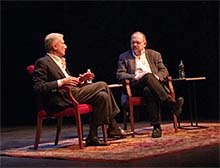
Werner sits down to discuss his work with Jonathan Moreno, the David and Lyn Silfen University Professor of Medical Ethics and Health Policy, Professor of Philosophy, and Professor of History and Sociology of Science at the University of Pennsylvania. Here is a brief video excerpt of their conversation. The full video of their engaging conversation can be found at the Bioethics Film Festival website.
Werner Erhard and Professor Jonathan D. Moreno, University of Pennsylvania, April 2016
The work that Erhard created in the 70s and 80s continues to produce results in people’s lives. “..the course works, in part, by helping participants to stop having past experiences affect their future decisions in ways that aren’t productive.” Canary Wharf Magaine, January 15, 2015
Friends of Werner Erhard on Twitter
When a thought is unleashed, the most amazing things happen: Sam Daley-Harris credits his work with Werner that led him to the decisive results of the Microcredit Summit that went on to earn Muhammad Yunis the Nobel Prize.
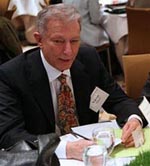
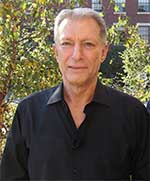
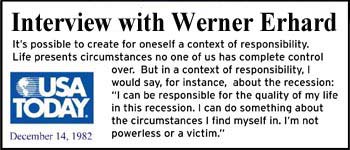
Read an Interview with Werner Erhard in USA TODAY
Transformation: The Life and Legacy of Werner Erhard


